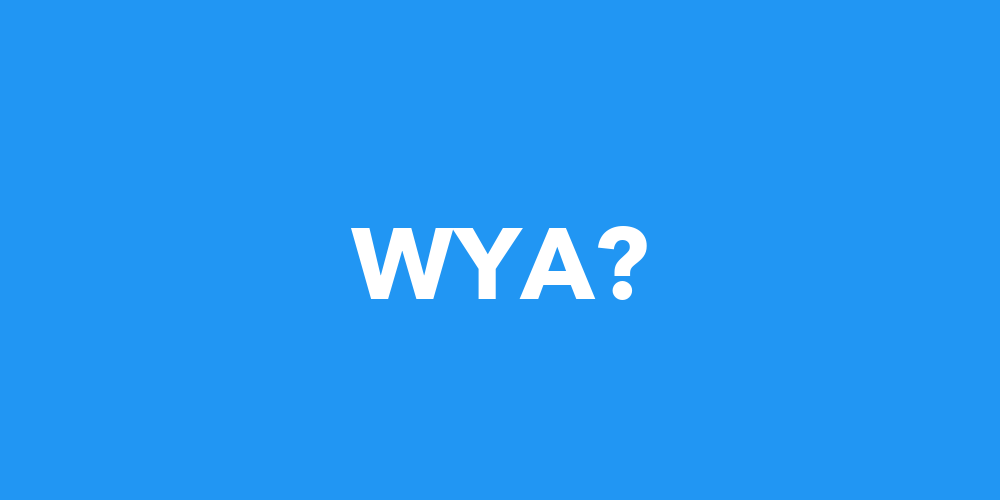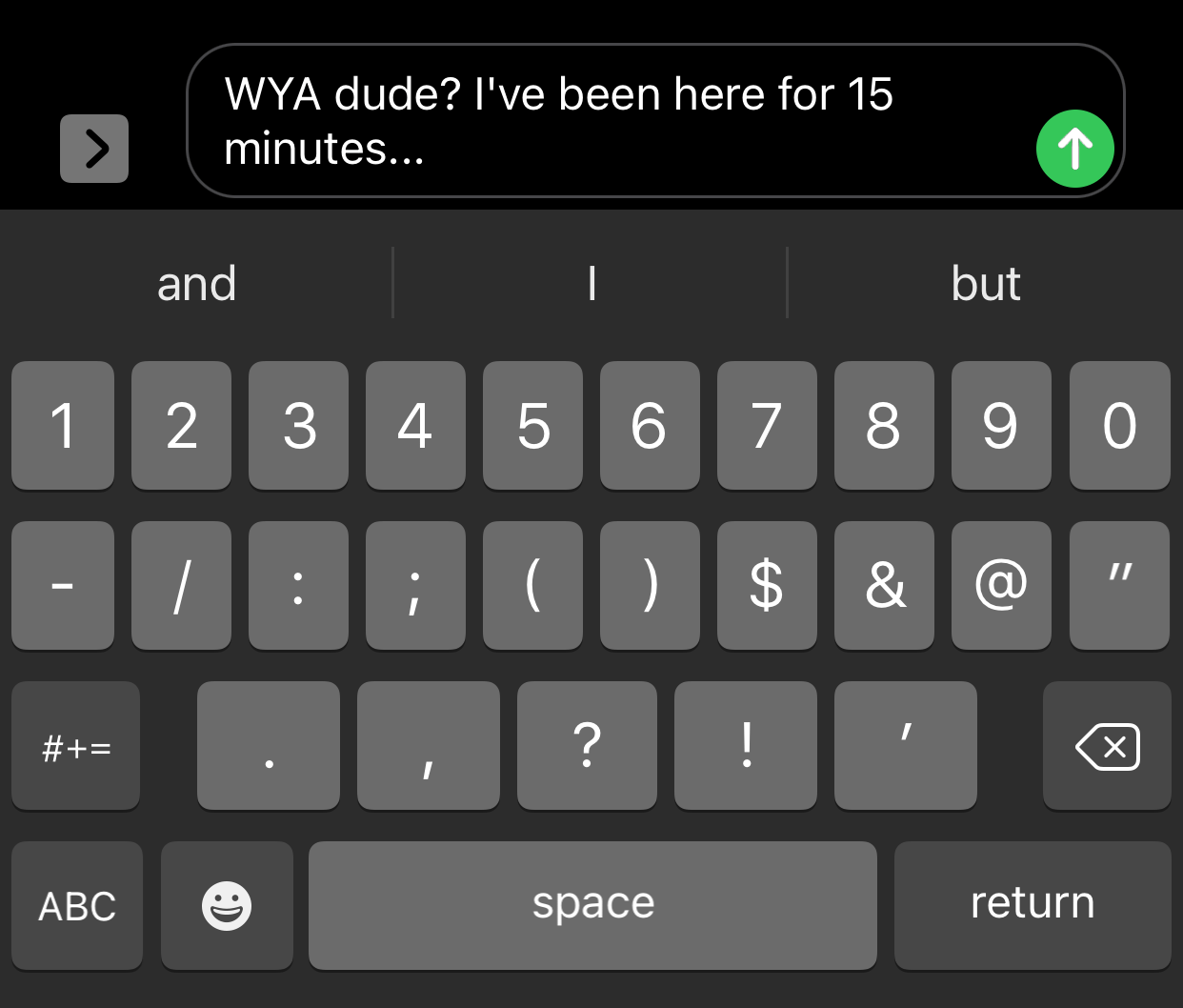WYA, which stands for "Where You At," is a popular slang term used in modern communication. This phrase has become a staple in casual conversations, both online and offline. Understanding its meaning and context is essential for anyone looking to stay updated with current linguistic trends.
As digital communication evolves, so does the language we use. Slang terms like WYA have emerged as a way to simplify and speed up conversations. They are often used in text messages, social media posts, and instant messaging apps. This article will explore the origins, meanings, and proper usage of WYA, ensuring you stay ahead of the curve.
Whether you're a teenager, a young professional, or someone curious about modern slang, this guide will provide valuable insights into WYA. By the end of this article, you'll not only understand what WYA means but also how to use it effectively in your daily conversations.
Read also:Phil Robertson A Deep Dive Into The Life And Legacy Of The Duck Commander
Table of Contents
- The Origin of WYA
- What Does WYA Mean?
- How to Use WYA in Conversations
- Common Variations of WYA
- Understanding the Context of WYA
- Examples of WYA in Real-Life Situations
- The Popularity of WYA in Modern Communication
- WYA vs. Other Similar Slang Terms
- Tips for Using WYA Appropriately
- The Future of WYA and Slang in General
The Origin of WYA
The slang term WYA has its roots in the early days of internet culture. It gained popularity in the late 1990s and early 2000s, when instant messaging platforms like AOL Instant Messenger (AIM) and MSN Messenger were widely used. These platforms encouraged users to create shorthand expressions to make communication faster and more efficient.
WYA quickly became a favorite among users because it was easy to type and understand. Over time, it transitioned from online conversations to offline interactions, becoming a part of everyday speech for many people.
Key Milestones in the Evolution of WYA
- Early adoption on AIM and MSN Messenger
- Spread to text messaging and social media platforms
- Integration into spoken language
What Does WYA Mean?
WYA is an abbreviation for "Where You At." It is a casual way of asking someone about their location or whereabouts. Unlike formal questions like "Where are you?" or "Can you tell me your location?" WYA carries a more relaxed tone, often used among friends or acquaintances.
This term is particularly useful in situations where you need a quick update on someone's location. For example, if you're planning to meet up with a friend, you might send them a message saying, "WYA?" to check if they're on their way.
Why Use WYA?
- It's concise and easy to type
- It conveys a casual and friendly tone
- It's universally understood in modern communication
How to Use WYA in Conversations
Using WYA in conversations is straightforward. You can incorporate it into text messages, social media chats, or even spoken language. The key is to ensure that the context is appropriate and that the other person understands the term.
For example, if you're texting a friend to confirm their location, you might say:
Read also:Selena Gomez Topless A Comprehensive Look Into The Controversy Media Impact And Beyond
"WYA? The movie starts in 15 minutes!"
Alternatively, if you're speaking to someone in person, you could say:
"Hey, WYA? We're waiting for you at the coffee shop!"
Best Practices for Using WYA
- Use it in informal settings
- Avoid using it in formal or professional conversations
- Ensure the recipient is familiar with the term
Common Variations of WYA
While WYA is the most common form of the phrase, there are a few variations you might encounter. These variations often depend on regional dialects or personal preferences. Some examples include:
- WYA? (Where You At?)
- WYD? (What You Doing?)
- WYTT? (Where You Trying To?)
These variations share similar meanings and are used in similar contexts. Understanding them can help you communicate more effectively with a wider audience.
Understanding the Context of WYA
Context is crucial when using slang terms like WYA. While it is generally accepted in casual conversations, it may not be suitable for formal or professional settings. For instance, using WYA in a business meeting or formal email could come across as unprofessional.
It's also important to consider cultural differences. In some cultures, asking about someone's location might be seen as intrusive or inappropriate. Always be mindful of the context and the relationship you have with the person you're addressing.
When Is It Appropriate to Use WYA?
- When communicating with friends or family
- When coordinating plans or meetups
- When the context is informal and relaxed
Examples of WYA in Real-Life Situations
Here are a few examples of how WYA might be used in real-life situations:
Example 1: Coordinating a Meetup
Friend 1: "WYA? The concert starts in an hour!"
Friend 2: "I'm stuck in traffic, but I'll be there soon!"
Example 2: Checking on Someone
Friend 1: "WYA? You said you'd be here by now."
Friend 2: "Sorry, I got held up at work. I'll be there in 10 minutes!"
These examples demonstrate how WYA can be used to quickly and effectively communicate about someone's location.
The Popularity of WYA in Modern Communication
WYA has remained popular over the years due to its simplicity and effectiveness. According to a study by the Pew Research Center, slang terms like WYA are widely used among younger generations, particularly those aged 18-24. This demographic is more likely to use shorthand expressions in their daily communication.
Furthermore, the rise of social media platforms like Twitter, Instagram, and Snapchat has contributed to the continued popularity of WYA. These platforms encourage concise and informal communication, making slang terms like WYA a natural fit.
Statistics on Slang Usage
- 70% of teenagers use slang terms like WYA in their daily conversations
- 50% of adults aged 25-34 are familiar with WYA
- 30% of adults over 35 have heard of WYA but may not use it regularly
WYA vs. Other Similar Slang Terms
While WYA is one of the most popular slang terms for asking about someone's location, there are other similar terms you might encounter. Some examples include:
- WYH? (Where You Heading?)
- WYD? (What You Doing?)
- WYTT? (Where You Trying To?)
Each of these terms has a slightly different meaning and usage. Understanding the nuances can help you choose the right term for the right situation.
Key Differences Between WYA and Other Terms
- WYA focuses on current location
- WYH focuses on destination or direction
- WYD focuses on activities
Tips for Using WYA Appropriately
To ensure you're using WYA effectively and appropriately, consider the following tips:
- Use WYA in informal settings with friends or family
- Avoid using WYA in formal or professional conversations
- Be mindful of cultural differences and sensitivities
- Ensure the recipient understands the term
By following these guidelines, you can use WYA confidently and effectively in your daily conversations.
The Future of WYA and Slang in General
The future of WYA and other slang terms is closely tied to the evolution of digital communication. As technology continues to advance, new platforms and tools will emerge, influencing the way we communicate. Slang terms like WYA will likely adapt to these changes, remaining relevant and useful in modern conversations.
Additionally, the growing importance of inclusivity and diversity in communication may lead to the creation of new slang terms that reflect a broader range of cultural experiences. This could result in a richer and more dynamic linguistic landscape, where terms like WYA coexist with newer, more inclusive expressions.
Conclusion
WYA, or "Where You At," is a versatile and widely used slang term that has become an integral part of modern communication. By understanding its meaning, context, and appropriate usage, you can incorporate WYA into your daily conversations with ease and confidence.
We encourage you to share this article with your friends and family to help them stay updated with the latest linguistic trends. Additionally, feel free to leave a comment below with your thoughts on WYA and other popular slang terms. Together, we can continue to explore and celebrate the ever-evolving world of language!

